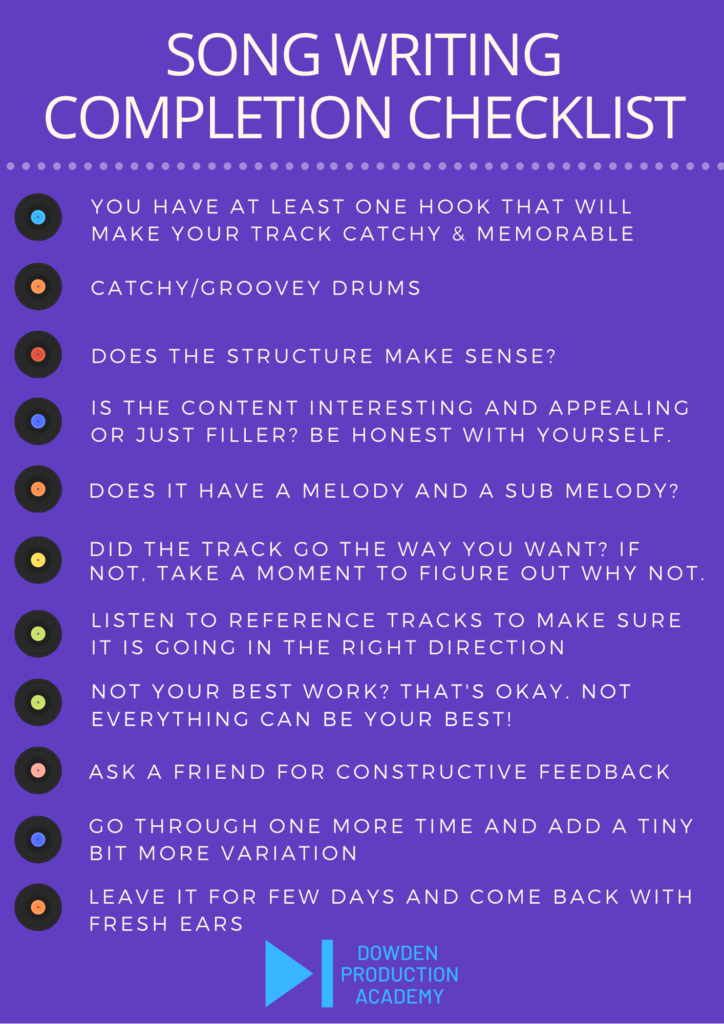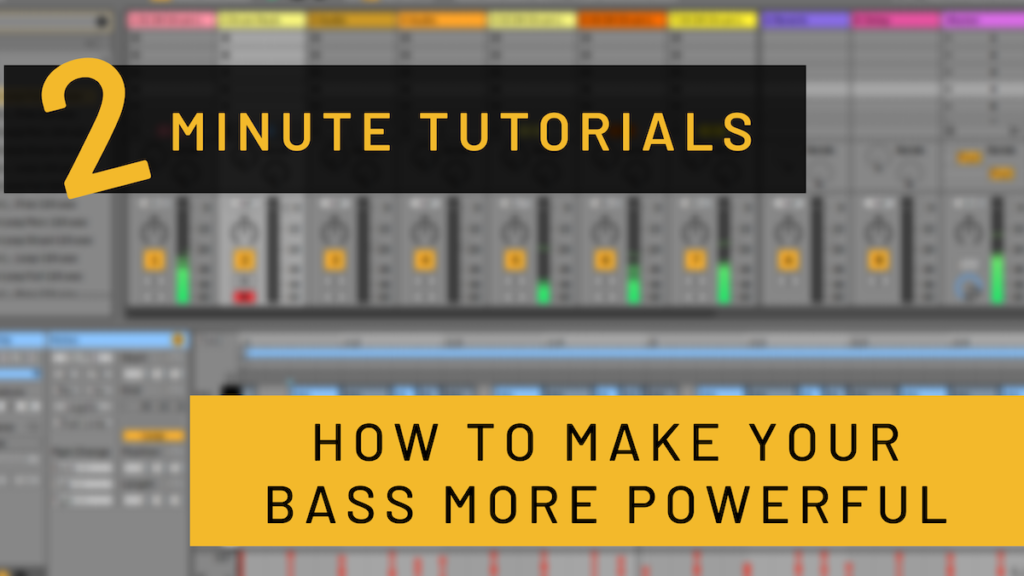If you’re a producer that has difficulties finishing songs, you’re not alone. Every producer goes through this frustrating phase of not being able to entirely complete songs. The most common issue is where producers write a loop ranging from 4 – 64 beats, but never actually grow that loop into a full track. It’s a common issue that I see all the time. So, I’ve composed ten tips on songwriting to help you finish writing tracks. You can adopt these tips into your workflow right away.
Make sure to read all the way to the end to grab your free tips on songwriting checklist!
Tips on Songwriting: Have an overall direction in mind
It’s a good idea to start writing your track with an idea of its general direction in mind. This can help with the writing process by immediately setting the tone for the type of track you want to make. This will help direct the track by being conscious and prepared with the sound or style you are hoping to achieve. Instead of trying to piece together a bunch of ideas that don’t share the same idea of an entire track.
Will the track be melodic? Dark? Low energy? High Energy? These are all guidelines to help you get the track rolling in the right direction.
The downside to this is that it can potentially restrict creativity, so only use this as a guideline to get you started or to get your writing back on track when you start to stray from your original track path too much.
Know when the track is finished (don’t overdo it!)
Sometimes it’s hard to know when a track is finished. You spend so much time and effort building the track from absolutely nothing. It can be difficult sometimes to know when to consider it complete. As producers, we listen to our songs over and over again, sometimes hundreds of times. We become numb to every single detail of the track. This causes us to want to keep adding more because we think the track is not exciting enough. This is a common habit and which causes us to over complicate tracks adding too many elements.
Instead of focusing on adding more and more to the track, try to simply finish writing the arrangement as is. Instead of adding more elements, try making the elements you do have a bit more catchy. This way you can finish writing the track, and you’re more focused on the quality of the elements, not just the quantity.
Write some melodies
Whether it’s a bass line, a lead, an arp, or a vocal, a good melody can really bring your track to life. It helps set the tone and is fundamental in creating sustainable music.
A lot of people have trouble finishing a track because they are lacking melodies. If you are having issues with melodies, try to keep it simple. One thing I tend to do is try humming some melodies before randomly throwing piano roll notes in. Catchiness is key. Get it? Key? Melodies? But seriously. Melodies that are catchier are much more memorable!
Set time limits for yourself
Setting a time limit for yourself can help put a bit of pressure to be productive. With a time limit set, you will be motivated to actually finish the track because you’ll know there is an end in sight. This doesn’t have to be concrete, of course. Don’t leave a track simply because you’ve hit your time limit! But having a general limit in place will give you some motivation to finish the track, instead of thinking you’ll finish it later (and never getting around to it).
Create a general arrangement and work around it
Creating a skeleton structure of a track is a great way to shape your song’s arrangement, even before all of the elements are added and the writing is done. Even if you only have a bit of the track written, laying out the entire structure for the track can help guide your decision making.
If you’re unsure how to properly structure your track, use reference tracks to get ideas of the type of structure you’d want. We’ll talk more about this below!
Give yourself a break
This seems counterproductive because you want to spend your time finishing your track! But the thing is when you’re having a hard time working on something, giving yourself some time to clear your head will be very beneficial. Even 5 or 10 minutes to sit back and take your mind off the track will help you come back with a fresher mindset. The longer the break, usually the better. Give yourself time to reset your mind and get back to work with a bit of a different perspective. This is especially true if you’re becoming frustrated or discouraged.
Walking away might not be easy, but giving yourself some time to reset will be well worth it for your productivity. Some of these tips on songwriting, like this one, are also helpful when you are faced with writer’s block!
Don’t get too distracted
Sometimes a distraction is a good thing and can give your mind and ears a break. But too many distractions can ruin your productivity and disrupt your workflow. Especially if you’re deep into an idea or theme of a track’s layout, you can lose your train of thought. You can forget the ideas, melodies, or structure you had in mind to use on your tracks. Therefore, try to limit the distractions around you (unless you’re taking a break of course).
Use templates to offer some sort of guidance (without relying too heavily on them)
If you find yourself not able to successfully lay out the structure of a track, try creating a template for yourself to follow. The template can set guidelines to get a general structure laid out for your track. Of course, you can change the structure however you see fit. With a template, you can have a general idea and starting point to work from. This can encourage you to fill out the rest of the track.
Remember, try not to rely too heavily on your templates, or risk your music sounding too similar.
Reference your favorite tracks
This is one of my favourite tips for songwriting. Listen to some of your favourite tracks, and follow along to learn how these tracks are structured. Ask yourself questions like what makes this a good track? How long is it? How many beats before each section of the track? Etc.
Learn from successful producers and create habits from formulas that are proven to work. Don’t forget to always put your own spin on it!
Know when to move on from a track that isn’t working
If you are struggling to finish a song or you find yourself spending more and more time on tracks without gaining too much ground on them, you might be stuck in another music production loop: not knowing when to let a track go. This tends to happen when you find yourself trying new versions, new ideas, and coming back and making changes to something over and over without making any real progress.
Sometimes the material we have is just not something that is worth continuing, because the foundation just doesn’t work. That’s totally fine. It’s all part of the process. I know it’s difficult to leave something you’ve spent time on. But think about it this way: the sooner you let a track that isn’t working go, the sooner you can start working on something new. Nine out of ten times, the best tracks I write come more naturally and are less forced. They’re the ones I’m able to write more naturally because I left other tracks alone. Chances are, if you’re forcing your writing, the track might not have a good foundation, and might not be worth finishing.
By getting in the habit of understanding when your track isn’t working, you can start to understand when a track is more worthy of finishing. You’ll be more inclined to finish the tracks with a good foundation because you know they can turn out to be better songs in the long run. And who knows, maybe after enough time, you can return to the original track with completely fresh ears, new ideas, and finish it after all.
Now Go Finish those tracks
Hopefully, these ten tips on songwriting have inspired you to finish more of your tracks. With every track you finish, you gain more production experience and learn more and more. Even if the track is not your best work and may not get released, getting in the habit of finishing your tracks will help you progress as a producer.
As promised, I’ve created a simple checklist you can reference to help you understand when a track is finished. You can grab my entire collection of studio session checklists here!







